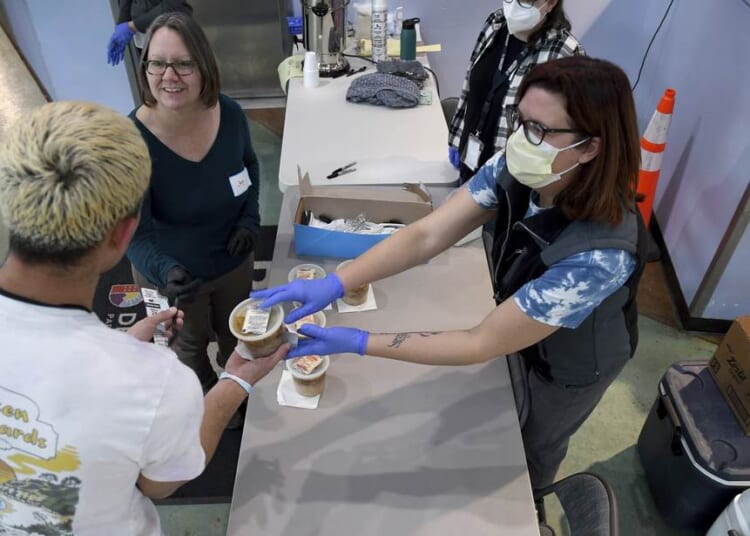This will shock you, I know.
Well, probably not, unless you are an advocate of the whole “sanctuary” phenomenon, which is based on the idea that kindness alone will suffice to ensure that opening the doors to every Tom, Dick, and Harry will turn out well for everybody.
Denver’s major public hospital is hemorrhaging money as migrants flood the cityhttps://t.co/Q1uWGSWpG6https://t.co/Q1uWGSWpG6
— Not the Bee (@Not_the_Bee) January 18, 2024
Denver isn’t exactly flooded by illegal immigrants by today’s standards. Only 36,000 have come through the city in the past couple of years, out of the 8-12 million Biden has been letting flood through the southern border.
Yet still the city’s health care system is on the brink of collapse. Denver Health has been reducing the number of beds available and turning patients away because they have been providing over $130 million in uncompensated care to migrants.
It turns out that the money isn’t unlimited, but the demands for it are.
Denver Health came close to breaking even last year after receiving millions of dollars in one-time donations, but executives say the safety net hospital needs more support if it’s going to continue operating as it has been — let alone meet the needs of Colorado’s mental health crisis and an influx of migrants.
The health system still is calculating its final 2023 numbers, but it appears Denver Health lost about $2 million last year, said Dr. Steve Federico, chief of government and community affairs.
Denver Health had ended 2022 about $35 million in the red, and the most recent year would have been significantly worse without a cash infusion of about $20 million from the state, Kaiser Permanente Colorado and private donors, he said.
“If we were to have another year like (2022), it would have dire consequences,” Federico said.
In 2023, Denver Health provided about $136 million in care that it didn’t receive compensation for, CEO Donna Lynne told the Denver City Council’s finance and government committee last week. That figure includes care to people covered by Medicaid when the rates the program paid didn’t cover the full costs, she said. About $100 million of that went to people living in Denver.
One-time donations of $5 million from the state and $10 million from Kaiser Permanente Colorado helped to narrow the gap. Typically, hospitals make up their uncompensated care through the higher rates they can charge private insurance, but patients with private coverage account for less than 15% of all those seeking care at Denver Health, which is lower than most hospitals in the area.
Denver Health cut costs last year by closing 15 beds that could be used for patients needing psychiatric or addiction treatment, reducing the raises it had planned as a way to retain employees, and postponing renovations on its oldest clinics, Lynne said.
Economics is all about making tradeoffs between competing goods when resources are limited, and as wealthy as the United States is, even our resources are far from unlimited. Illegal immigrants are entering the country and, for the most part, expecting everybody else to pick up the tab for their needs.
This doesn’t make them bad people–some are, some aren’t–but it does make them a burden who use up resources that could and should be spent to help legal residents and citizens of our country.
Sanctuary-types refuse to confront the fact that resources are limited, although a lot of Democrat mayors are facing that reality. However, their solution is to demand that others pick up the tab, either in border states (those racist bastards!) or the federal government.
The Colorado Hospital Association reported that, as of 2022, about 72% of hospitals in the state had “unsustainable” profit margins of less than 4% on the patient care they provided. Those margins don’t include income or losses from investments or services other than patient care.
Denver Health’s financial challenges aren’t over. In the last year, 8,000 migrants who came to Denver from Central America made about 20,000 visits to the health system, for needs including dental emergencies, mental health counseling and childbirth, Lynne said. The state and federal governments aren’t reimbursing the cost of those visits, which runs into the millions, she said.
“While I have tremendous compassion for what’s going on, it’s heartbreaking, it’s going to break Denver Health,” she said.
The city estimated more than 36,000 migrants have arrived since December 2022, and about half have decided to stay. Most are fleeing a humanitarian crisis in Venezuela.
Denver Health sent the Federal Emergency Management Agency a letter asking it to commit funds to support asylum seekers’ medical care, Federico said. It also is seeking support from the state and the city of Denver to offset the increasing costs of caring for unhoused people and the increasing number of Coloradans who need mental health or addiction care, he said.
Only 8000 migrants visiting Denver Health turned into 20,000 visits, which in turn turned into reduced services for the residents of Denver. Translate that into 8 million spread around the country, and you can see the size of the crisis.
And it is only getting worse by the day.
What we are seeing is the systematic and intentional destruction of our society. You can speculate about the exact motivation behind it–I know what I think–but you can’t deny that the Biden Administration is intentionally opening our borders or deny the fact that the consequences for Americans are devastating.
I know Republicans are very angry at each other over the battle for the nomination, and there is a potential for a split within the party.
But look at what we are facing, and imagine another 4 years of Biden.











